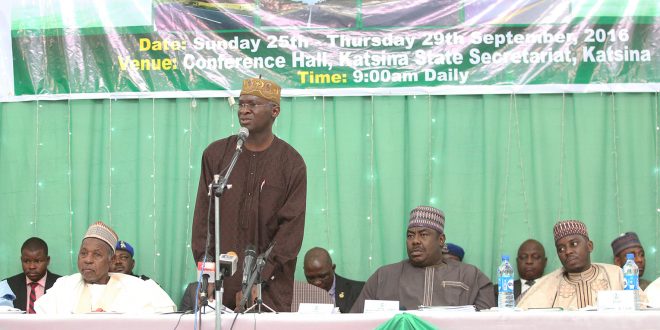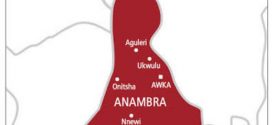
 IN KATSINA HELD BETWEEN MONDAY 26TH SEPTEMBER AND FRIDAY 29TH SEPTEMBER 2016
IN KATSINA HELD BETWEEN MONDAY 26TH SEPTEMBER AND FRIDAY 29TH SEPTEMBER 2016
Ladies and Gentlemen:
I would like to begin my address to council by expressing our gratitude to the Governor of Katsina State, H-E, the Rt. Hon Aminu Bello Masari, and to the Government and the people of Katsina State, for agreeing to host us.
In addition to this, I will also like to emphasize that apart from being the home state of our President, Mohammadu Buhari, Katsina is the home of Daura, a place of very rich history.
Daura reminds me of my history classroom in secondary school in Lagos where I first learnt of the fable of Bayajidda, a hero of Hausa folklore and mythology.
The story tells us how Bayajidda helped to kill a snake that prevented people from drawing water from a well and how the Queen, Magajiya Daurama, married him out of gratitude, and one of their seven children was named Daura.
Not only must we continue to project this story, and highlight the tourist opportunities here, it is important to
2.
connect these stories to the origins of the seven Hausa states and how they evolved into modern Nigeria and the history of what is now known as Katsina State.
Ladies and gentlemen, this is where the work of this council becomes most important, not only to rebuilding Nigeria, but also towards re-integrating Nigerians.
I believe that transport infrastructure, such as roads are a fundamental requirement for developing our tourism economy because tourism is about destinations, and if people have difficulty getting to destinations, or it is impossible to do so safely, then tourism will struggle.
But it is not only tourism that will struggle, the larger economy struggle to grow with a poor transport infrastructure.
Cost of goods and services will rise and will be passed on to consumers.
Quite apart from this, human and national integration will be affected if we cannot travel, interact and integrate.
We grow apart instead of growing closer.
We stand a grave risk of also losing our history if our children cannot travel from Oyo to Kano, or from Katsina to Obudu, and many other beautiful parts of this country.
- This is how important our work is when we set out to build road and bridge.
We are actually building the bonds of connectivity of the Nigerian family, we are building relationships that bind us by trade, knowledge and a shared history that leads to understanding and peaceful co-existence.
A recent text message I received from Mrs. Mbuk, on telephone number 0803 451 1827 from Calabar tells this story vividly and I will share it with you.
In her text message sent to me on 22 September 2016 she said:
“Good evening Honorable Minister. I am Mrs. Mbuk and I live in Calabar. I wanted to congratulate you on the intervention by NDDC on Calabar-Uyo road. I was able to see my aged mother in Uyo after two long months as the road was impassable. The Acting MD NDDC has shown that we are really in a change era. God will bless her. I have hope that Nigeria will rise again.”
Ladies and gentlemen, as far as the congratulations are concerned, they belong to Mr. President who appointed the Acting MD NDDC, and I say amen to the prayer for the MD in NDDC, because she has shown compassion by intervening to bring relief to a community in need.
It is our responsibility as the Federal Ministry of Works to fix the road and we have commenced the work of the design, preparatory to finalizing the costs and awarding the contract to reconstruct the road.
But while I am still on the subject of these roads and other bad ones, let me say that those roads did not go bad in the last one year.
Most of our roads and bridges have not benefitted from routine maintenance for decades.
They had been deteriorating progressively over the years.
They were going bad at the time the country was getting richer and selling oil for $100 per barrel of oil.
They went bad at the time our government said it preferred infrastructure of the stomach to real infrastructure.
I know some people do not like to talk about yesterday but I will not stop talking about yesterday because it will help us understand what is happening today and it will help us determine the difference between yesterday and today and give meaning to change.
The story of yesterday is that about 206 (TWO HUNDRED AND SIX) road contracts had been awarded between 2002 – 2014. Their contract value of these roads is about N2.2 Trillion.
Over the last 12 years, only about N700 Billion has been paid, and in the last three years, most, if not all, contractors have not received money for work done.
This was at the time that our economy was supposedly being coordinated, and when we were earning more money from crude oil sales.
Instead of budgeting to fund roads, we are now seeing where the money went. Only N18 Billion was budgeted for all federal roads in Nigeria in 2015.
That was yesterday.
The first time most contractors are receiving any payment from Government for over 3 (THREE) years was in June and July this year when the Ministry of works paid out N73 Billion to some contractors to return to work and re-engage workers who had been laid off.
6.
Very soon, we will pay some more money as soon as our accounts are credited with the second-quarter release.
That is the picture of yesterday and an insight into today.
Now let me share the plans for tomorrow and sustainability with you.
In every state of the federation, the Federal Government in the Ministry of Works is represented by personnel who are led by controllers.
Our plan is to challenge and empower the controllers to be more effective and responsive to the states and communities they are posted to; and to hold them to account for the quality of federal roads within their states.
We have met with all federal controllers and they have agreed to take on this responsibility.
Their success will depend on a number of factors, some of which are in the control of the states and some of which are in the control of the Federal Government.
The controllers have been briefed to recognize their roles as ambassadors of the federal government in their states of posting.
- They have been mandated to develop closer working relationships with the state governments, the governors, the commissioners responsible for road works and infrastructure, the local government representatives because federal roads traverse local governments, and also the traditional rulers and community leaders through whose domains our federal roads traverse.
So I want to use this meeting and the opportunity of the presence of state representatives to urge you all to develop closer working relationships with your controllers.
They must share with you the information about federal roads in your state, while I expect that you will share with them, your individual state development plans, in order to establish critical interfaces and build lasting partnerships for development.
For want of a better example, let me urge you to treat and welcome our controllers with the same warmth and hospitality that you usually extend to Ambassadors from other countries, and to promptly report difficulties to us in the Ministry whenever they occur.
Let me be clear that for me and members of our team, this is about development, and Nigeria, and I expect these relationships to transcend our political affiliations because developments is a daily undertaking while political contests are seasonal encounters.
8.
The Federal Government is a partner to all States and not a competitor with any.
In exchange for these new relationships for development our controllers have been tasked to:
-
Begin a process of identifying and reducing potholes with a view to eventually eliminating them;
- Ensure that as many villages and towns are properly located and sign boards erected at their boundaries so that commuters can know as they travel what village or town they are approaching, entering or leaving as well as the distance;
- Restore kilometer sign posts to all federal roads within their states to assist drivers and road users know how much progress they have made on their journey
- Restore all lane marking and highway signs on the roads within the state.
-
Clear federal highways of vegetation overgrowth for safety of commuters and, as much as possible, use local people to do these jobs in order to create some employment opportunities.
- Recover the full width of the Federal right-of-way of 45.72 metres on both sides from the centre line.
9.
- Remove all obstructions from highways such as speed breakers and develop better solutions such as pedestrian bridges where necessary to eliminate collision between vehicles and pedestrians
- Work with sector commanders of the Federal Road Safety Corp to enforce the new speed limit regulation, educate road users about safety and enforce the law against unqualified drivers from using our highways and reduce the danger they pose to themselves and other citizens.
Let me express my support for a road safety initiative that the FRSC is set to commence in our highways in order to promote safety.
They plan to increase highway patrols and ensure that motorists stay and maintain the use of the right lane unless they are overtaking.
This accords with global best practice and FRSC plans a pilot programme that will increase slowly until nationwide coverage is achieved.
As far as the recovery of the right-of-way is concerned, it is a matter of utmost priority.
The full width of our roads has been encroached by illegal activity in the name of trading and business.
10.
When we spend money to build a road of two or three lanes and one or two lanes are taken over by trucks parked on them, or traders positioned on them, it constricts movement, causes traffic, results in lost man hours and stifles the economy.
This is not the way to build property and it must stop.
We need the support of the state governments to work with our controllers to recover the right-of-way.
Let me be clear. I am not against trade. Indeed, improved trade and commerce is what the economy needs most.
The roads that my ministry is charged to build and repair are meant to boost trade and commerce.
But trade and commerce that takes place right on the highway or within the 45.72 metres right-of-way is illegal counterproductive.
So let me clearly restate our objective. It is not to relocate or drive away traders, it is to locate them to the set back of the 45.72m right way and we will not compromise on this.
11.
If the first thing we achieve is the recovery of the right-of-way, commuters will be able to report a better traveling experience this December.
In a related matter of trade and abuse of our highways, my attention has been brought to the sad and unpatriotic actions of petroleum products transporters who are now carrying cargo of up to 60,000 litres on our highways, instead of the maximum of 33,000 litres approved by law.
This must stop without delay.
It is illegal business done at the expense of Nigerians.
Ladies and Gentlemen, in advocating for a recovery of the right-of-way, let me be clear that I do not advocate bulldozing and demolition of property.
Our objective is to make life better not to make it more difficult.
Our objective is to support commuters and those in the transport business.
Therefore, one of the things we must do, is to be methodical.
First thing we have done in the ministry is to refuse to renew
12.
permits given to people to occupy our rights of way, where permits have now expired.
People who fall into this category of expired permit holders must understand that we will not renew, and the violation of this policy will attract sanctions.
Furthermore, such people now have an opportunity to voluntarily relocate, before we start to re-possess.
Furthermore, I have discussed with the Hon. Minister for Labour about the need to meet with the transport unions of owners and operators to explain the policy and benefits to their business.
I urge you, the state representatives, to embrace a similar engagement with the state chapters of these unions.
Most importantly, we must bear in mind that the structures that encroach the right of way are different sizes and categories.
Some are temporary and easier to move. Some are permanent and will require time to move.
The critical thing is for all encroachers to understand that they violate an existing law of the land by occupying any
13.
part of our 45.72 metres right-of-way from the centre line on either side of the road.
Once this is accepted as I expect that it should, they will better appreciate any accommodation or assistance that we can offer to relocate their business outside the right of way, but within the area; in a more organized and legally compliant way.
This is one example of change beginning with us.
To respect the Federal Highway Act, and the 45.72 metres right-of-way and to do business according to the law.
And I will be counting on the support of the Governors and their Commissioners in this regard because these activities take place in the States.
As for the targets that I have set out for our controllers based on our meeting, let me also say that they have financial consequences which are not in the budget for 2016.
They have all been directed to undertake individual assessments in their states and submit their budgets to us for inclusion in the 2017 budget estimates.
-
It is important to make this point for those who will expect immediate results.
The ability to deliver this plan depends on the budgetary approval that we get and the funding that is made available.
In addition to the above, we have developed a three-year plan for Federal roads between 2017 and 2019.
This plan is being shared with the ministry of budget and planning for inclusion in the 2017 budget and future national planning data.
The plan ensures that year on year, major road projects are implemented justly and fairly in each of the six zones.
Our plan is to connect states within each zone and across the country.
Because our resources are limited, we have to make choices.
Our choices are informed by:
15.
- Input from the Ministry of Agriculture and Co-Operatives, who have provided data of critical roads in each of the six zones that are necessary to help evacuate farm produce to market;
- Our need to develop mining business and evacuate mining products and petroleum cargo to fuel the nation’s energy needs, so roads leading to and from fuel depots have come high on our priority of choices;
- Our need to support the business of traders and importers; therefore we have given priority to roads leading to and from our major sea and airports;
- Our need to move large numbers of commuters also compels us to give priority to roads that carry very heavy traffic in order to reach more people with limited resources;
Therefore, while it is true that we cannot build all roads in one year or even in three years, we are convinced that a faithful implementation of our plan, and the rational basis of our choices will deliver a better road experience, improved journey times and aid economic recovery in the short to medium term.
Before I conclude, let me speak to two equally important issues.
The first is safety and insurance.
16.
At a recent insurance summit held in Abuja where I was invited to speak, I made the point that insurance business is not growing and employing as many people as it can.
I remarked that enforcement of insurance laws has either diminished or is not taken seriously.
I committed to do my own part by ensuring that every contractor working for the Federal Government must show proof of a minimum of workplace safety and compensation insurance policy, as a commitment to the safety of employees before we pay them for work done.
I want to recommend a similar commitment to you all in your states, as a step to ensuring safety of workers, and as a boost to the insurance sector of our economy.
The other matter is debts owed by the Federal Government to the states.
I wish to state that in fulfillment of the promise to redeem these debts, Mr. President constituted a committee of ministers, which I chaired, to review the claims.
We have recently submitted a report which is receiving attention with a view to developing a payment solution that will require intergovernmental, inter-ministerial and parliamentary support.
17.
Finally, ladies and gentlemen, let me conclude by saying that our national road network and bridges are the life-support system of our economy and our national integration.
Better roads are a sign not only of development, they are the pathway out of recession and highways to recovery and prosperity.
Not only must we keep them well, we must use them well and treat them as personal property.
I am sure that if we adopt and faithfully implement some of these recommendations and those contained in the various well researched memoranda that have been considered, the story of bad roads in our country will be consigned into history in a short time.
As I wish us a very fruitful deliberation, I urge us all to act with resolve and dedication.
I urge us to remember Mrs. Mbuk from Calabar, she is the name and face of millions of Nigerians we will probably never meet, but we certainly can reach by building a road for them to prosper, if we do our work with passion and dedication.
Thank you for listening.
Babatunde Raji Fashola, SAN
Honourable Minister of Power, Works and Housing
Monday 26th September 2016
 Hottestgistnaija.com
Hottestgistnaija.com





